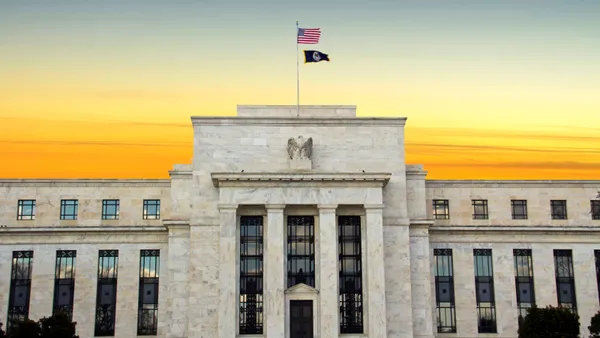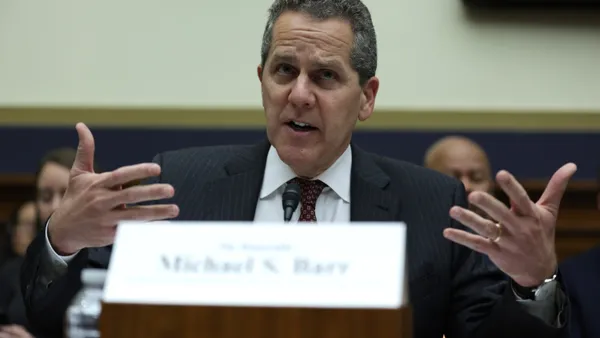UPDATE: Jan. 10, 2020: Argo Partners, an investment firm that specializes in buying distressed assets, is offering to purchase claims against cryptocurrency exchange QuadrigaCX. About 76,000 customers of the exchange claim they were left without access to $163 million in cash and cryptocurrencies since Quadriga went offline last year in the wake of CEO Gerald Cotten's death, which has been called into question.
“We offer an upfront, guaranteed payment and also the ability to share distributions if they go above a certain point,” Jonathan Maruri, head of trading at Argo, said in a LinkedIn message seen by Bloomberg. “Given the unknowns in a case like this, we have found it useful to offer creditors deals that lock in rates of recovery early in the case while also protecting themselves from the case taking a turn for the better.”
Maruri declined to say how much Argo Partners was offering creditors for their claims.
Dive Brief:
- Lawyers for disgruntled crypto investors asked the Royal Canadian Mounted Police in a letter Friday to exhume the body of a cryptocurrency trading platform CEO who died under "questionable circumstances" last year at age 30 while on his honeymoon in India.
- The exchange, QuadrigaCX, did not announce Gerald Cotten’s death until more than a month afterward, and during that time, it accepted deposits but did not allow some users to withdraw funds, CoinDesk reported.
- QuadrigaCX went offline in January 2019, filed for creditor protection and announced that Cotten was the only person who knew the private keys to exchange’s “cold wallets” (secure, offline storage), leaving about 76,000 customers without access to $163 million in cash and cryptocurrencies.
Dive Insight:
Cotten’s death has been under suspicion since it was announced, with some circulating a conspiracy theory that the CEO may have faked his own death.
Cotten’s widow, Jennifer Robertson, wrote that he died of complications from Crohn’s disease, which is rarely fatal. However, a death certificate obtained by CoinDesk from the Indian hospital where Cotten reportedly died misspelled his name.
Jayant Sharma, a gastroenterologist who treated Cotten and produced a medical report about his death, confirmed to The Globe and Mail that the man he saw matched photos of Cotten. But the doctor expressed doubts about other aspects of the case. "We are not sure about the diagnosis," he said.
Auditors Ernst & Young found in May the exchange’s crypto wallets were empty, with most of the crypto holdings transferred to other exchanges and wallets. Auditors have recouped about $25 million, according to The Telegraph. But nearly all of that money was cash.
Substantial amounts of money had been transferred to Cotten’s personal holdings, the auditors found. Cotten appears to have overstated the company’s revenue, and reportedly created fake accounts, using them to trade counterfeit bitcoin for real cash and cryptocurrency, according to the audit. It appears Cotten has kept no records since 2016, according to The Washington Post.
Robertson, Cotten’s widow, agreed in October to transfer nearly all of her assets to Ernst & Young for liquidation and released a statement saying she was unaware of her husband’s “improper actions” while managing Quadriga, according to The Globe and Mail. "I was upset and disappointed with Gerry’s activities as uncovered by the investigation when I first learned of them," she said.
In court filings, Robertson detailed her attempts to recover the cold wallet keys. "The laptop computer from which Gerry carried out the companies’ business is encrypted and I do not know the password or recovery key," she said, according to the Guardian. "Despite repeated and diligent searches, I have not been able to find them written down anywhere."
Miller Thomson, the law firm representing affected customers, enclosed in its letter Friday to the Mounties "publicly available information on the history of Quadriga, Gerald Cotten and others related to Quadriga which, in our view, further highlight the need for certainty around the question of whether Mr. Cotten is in fact deceased."
The firm is asking that an exhumation and autopsy to confirm Cotten’s identity and cause of death "be completed by Spring of 2020, given decomposition concerns," according to the letter.
Investors started to question "the authenticity of the formal documents in a country notorious for the ease at which falsified documents can be purchased, particularly after they learned that the death certificate misspelled Cotten’s name, and that the former chairman and managing director of the company that ran the hospital had been convicted of financial fraud two months earlier," according to Vanity Fair. The magazine also noted Cotten had written a will just four days before going to India.
Robertson said through her attorney, Richard Niedermayer, she was "heartbroken to learn of [Miller Thomson’s] request."
"Gerry died on December 9, 2018 in India — an independent investigation by the Globe & Mail confirmed this earlier this year, and it should not be in doubt. While Ms. Robertson has assisted the Quadriga Affected Users in the recovery of assets, and has cooperated fully with Ernst & Young’s investigation, it is not clear how the exhumation or an autopsy to confirm the cause of Gerry’s death from complications arising from his Crohn’s disease would assist the asset recovery process further," the statement said.
Earlier in 2018, about $25 million of QuadrigaCX’s assets were frozen after authorities found "irregularities" in the company’s payment processes. Days before Cotten died, the funds were returned to the company, according to The Washington Post.
Several agencies, including the FBI, are investigating Quadriga, which is undergoing bankruptcy proceedings in Toronto.












